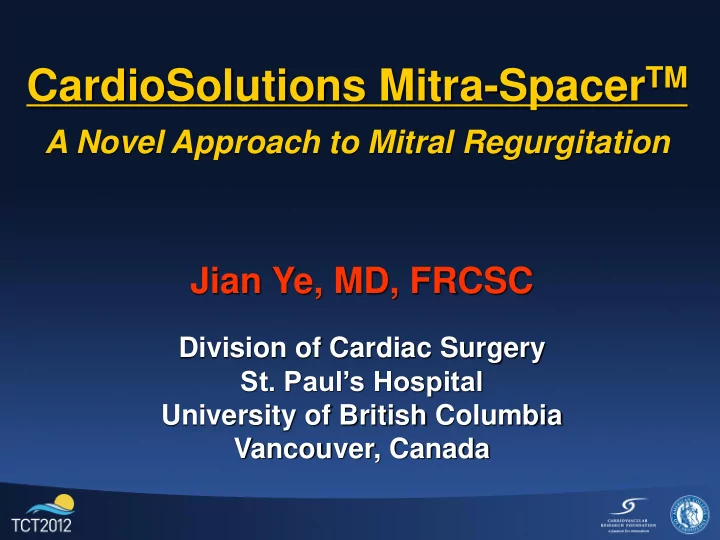

CardioSolutions Mitra-Spacer TM A Novel Approach to Mitral Regurgitation Jian Ye, MD, FRCSC Division of Cardiac Surgery St. Paul’s Hospital University of British Columbia Vancouver, Canada
Disclosure Statement of Financial Interest I, Jian Ye , DO NOT have a financial interest/arrangement or affiliation with one or more organizations that could be perceived as a real or apparent conflict of interest in the context of the subject of this presentation.
Minimally-Invasive MV Repair Technologies • Leaflet Coaptation • Annular Reshaping Edge-to-Edge Repair Cinching Alfieri Stitch Annuloplasty
Cardiosolutions Mitra-Spacer TM
In Vitro Study Cardiosolutions Spacer Boundary Condition Characterization
In Vitro Study Cardiosolutions Spacer Boundary Condition Characterization
Acute and Chronic Animal Study Transapical Approach
Chronic Animal Study Patchy mild granularity of Anter surface of anterior leaflet ior A Leafl A (predominately affecting A2 Poste A P 3 et rior 1 2 1 P P and A3), and mild endocardial Leafl 2 3 et fibrosis of the left atrium above P3 after 391 days
Clinical Feasibility Study Percutaneous approach (acute study) Left atrium Cusps of mitral valve Balloon spacer Anchor hooks deployed into tissue Apex of LV Figure 7. Implant deployed
Clinical Feasibility Study Percutaneous Approach (acute study) After the Spacer Before the Spacer
Clinical Feasibility Study Transapical Approach (acute study)
Clinical Feasibility Study Transapical Approach (acute study) Before Mitra-Spacer After
Potential Advantages of Mitra-Spacer ™ • Safe, fast, intuitive procedure • Small access portals • Percutaneous or transapical approaches • No change in the native mitral valve and heart anatomy after short-term implantation • Minimal alterations in mitral structure following long-term implantation – does not preclude patients from subsequent surgical MV repair
Potential Indications • Functional MR • High surgical risk patients with either functional or structural MR Long term or bridge therapy • Non-surgical patients with either functional or structural MR Long term therapy (Permanent solution?) • MR patients undergoing other transcatheter procedures - TAVR: patient with AS and MR - PCI: patient with CAD and MR
Recommend
More recommend